Celebrating Diwali Mindfully This Year – Why We Do What We Do
By Shuchi Mehta
Let’s take a mental vacation to any town in, say, the Indian state of Gujarat during Diwali. Upon entering the town, the streets would likely be ignited with stunning diya lamps (oil lamps made of clay) and filled with ornate decor. People are cleaning their homes to welcome guests. Diya lamps and exquisite rangoli designs elegantly grace every front porch. Children are enthralled at the mini firework displays ensuing in every home. Friends and family are dressed to the nines, exchanging gifts and greeting each other with a “Namaste.” Grandiose temples resonate with prayers and songs worshipping the Goddess Lakshmi and by the end of the festive night; our stomachs are filled with an unfathomable amount of desserts and savory snacks.

If any of these resplendent images bring a sense of comforting nostalgia to your mind, you may be one of the millions of Hindus, Sikhs, Jains or other cultural sects that celebrates Diwali this time of year. Diwali is a multi-day holiday that is celebrated with as much fervor and zeal as Christmas is by many Christians.
As an Indian-American adult, Diwali plays a special role in my life…now. However, as a child growing up in the middle of Not-Very-Diverse-Ville, Missouri, I didn’t really care. In fact, if I saw my mom practicing some of these traditions in the home, I would take it as a cue to go to my room until it was over.
I soon realized I needed to know why in order to care about this aforementioned cultural context that I was so extricated from.
A Mindful Minute: Cultural Context
A few quick facts to know about India, Diwali’s country of origin that may help to illuminate the cultural context of the holiday:
- Today, India is one of the most diverse countries in the world composed of thousands of cultures and microcultures, at least 7 major practiced religions, and a plethora of languages and dialects. Understandably, a pan-Indian holiday such as Diwali is practiced in vastly different ways.
- India is home to a rich and ancient religious and cultural history. In fact, Hinduism is considered to be one of the world’s oldest living religions. Due to its age and open-mindedness however, many of the motives behind the rituals have been lost or forgotten. When we rewind the rituals back to ancient Vedic times, it’s apparent that each and every ritual had some scientific, psychological, or life-oriented philosophy at their base.
- Most religions in India are not compartmentalized away from way of life. Religion and culture are very much intertwined. Many religious practices permeate and manifest into daily routine.
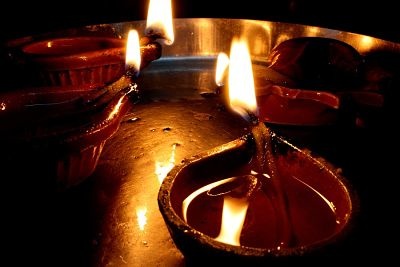
What are common rituals associated with Diwali?
Despite your location, religion, or sect, most people that celebrate Diwali engage in some form of these practices. Many Indians light clay oil lamps called diyas, make desserts and delicious snacks to share with family and friends, gather with extended family and friends, bow down to show respect to the family elders, create beautiful designs called rangoli out of colored rice flour and much more depending on where your family hails from. Just like gift giving and adorning a tree during Christmas, all of these are traditional rituals and practices.

In this day and age, many of these ancient traditions have continued to live on, especially if you have a grandparent or parent around that continues to practice them. However, what is the meaning behind these rituals? If we are not mindful of the rationale behind these traditions, our future generations are likely to go one of two ways: to mechanically practice them because their parents did it, and their parents did it before them…or just completely reject them.
What is the true spirit of Diwali?
Diwali is a time of rejoicing, cheer, and delight. A celebration of light. A realization of the enlightenment and radiance in our lives.
What is the deeper meaning behind some of the rituals?
The diya oil lamp represents radiance. Diwali derives from the Sanskrit word “Deepavali” meaning row of lights. The pervading theme throughout the multiple days of the festival is the triumph of light over darkness, good over evil. For many Hindus, lighting diyas dates back to the return of the legendary Hindu God-King Rama to his kingdom after killing the demon, Ravana. Thus it symbolizes a time for introspection on how to eradicate our own “demons” of jealousy, greed, laziness, hatred and bring out the light within.
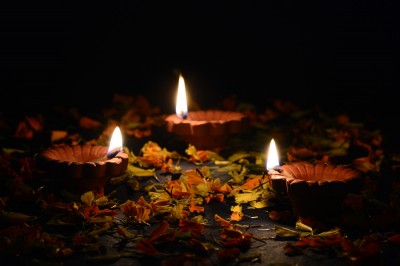
Diwali precedes the New Year for certain states in India so in a sense, this time of reflection precedes a fresh start for many.
Another standard practice amongst the many versions of Diwali celebrations is Laxmi Pooja or the worship of the Goddess Laxmi, the goddess of wealth and prosperity. It is known by various names such as Dhanteras in the state of Gujarat.
In the Indian socio-religious belief, wealth is considered worthy of respect and reverence. Wealth is seen as more than just financial status. Wealth is family, friends, this life, good health, our God-given faculties of mind and intellect, our skills and abilities, etc. Worship of this wealth includes expressing gratitude for all that has been given and vowing to utilize it for noble purposes.
It is believed that since our wealth and/or our ability to earn wealth are given by a higher power, using it only for selfish purposes is inhumane.
Gathering extended family and friends and sharing sweets is a frequent practice during Diwali. This speaks to the utmost importance that Indian culture gives to family. Culturally, family relations are so valued that most Indian languages contain a word for almost each family member that describes their exact relationship to the speaker (e.g. In English, the word “uncle” could describe your father’s brother or your mother’s brother, but is distinguished as chacha and mama in Hindi).
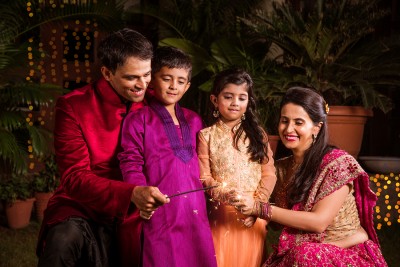
celebrating diwali festival, outdoor
Furthermore, Indian society reveres age and associates it with wisdom. Thus, bowing down to elders in the family with a namaskar (hands joined at the heart and a quick bow to show respect) is common practice especially during festival time.
Sharing sweets with family and friends on this day is a symbol of bringing sweetness into each of our relationships. The stickiness of the sugar or jaggery in the sweet reminds us to bring closeness and warmth into each family relation and each true friendship.
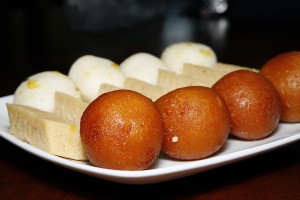
Many families in India decorate the front doorstep with an ancient form of art called Rangoli. Rangoli is gorgeous designs created by hand with handfuls of dyed rice flour. The rice flour is strategically and delicately dispersed in Indic designs such as paisleys, OM symbols, diyas, and much more. These designs are done to welcome guests into the home for Diwali. The colors and designs symbolize bringing color and brightness into our lives and for these various colors in our life to coexist with peace and harmony.
Given the highly symbolic nature of many of the spiritual and cultural practices of India, it is critical that we zoom in at times and take a look at why we do what we do. In a time where we encourage our children to question things instead of blindly follow them; it may behoove us to have a few answers ready for them before it is too late. Rituals do not sustain without reason and mindfulness. Diwali is the perfect time to bring to light the rationale behind some of these rituals.
What are some of the traditional rituals that you practice during Diwali and what do they symbolize?
More about Shuchi

Shuchi Mehta, Contributor
Shuchi Mehta is a Speech-Language Pathologist by day and writer by night. She graduated with a Masters in Speech-Language Pathology from Northwestern University in Chicago where her unique experiences in outpatient pediatric clinics, schools, and hospitals paved the way for her decision to work mainly in pediatric settings. She has a passion for writing and has written lifestyle and cultural articles for Seattle Magazine, Seattle Bride Magazine, and California Wedding Day. She loves to write about all things, but particularly enjoys writing about her experience as an Indian-American and growing up biculturally. She is currently working on a children’s book using this particular theme. Shuchi’s other loves are her family, pretending to be a hiker and yogi but never having the time for either one, Hindustani classical music, reading, really good ice cream, Hot Cheetohs, and traveling the world with her super awesome husband.
Have a question for Shuchi? Write to her at columnists@masalamommas.com
©masalamommas and masalamommas.com, 2016-2017. Unauthorized use and/or duplication of this material without express and written permission from this site’s author and/or owner is strictly prohibited. Links may be used, provided that full and clear credit is given to masalamommas.com and Masalamommas online magazine with appropriate and specific direction to the original content.


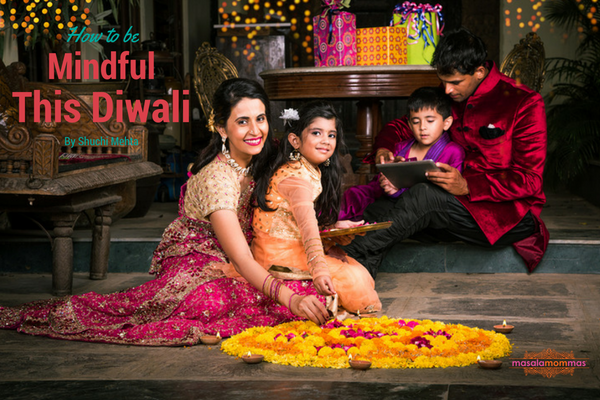
There are no comments
Add yours